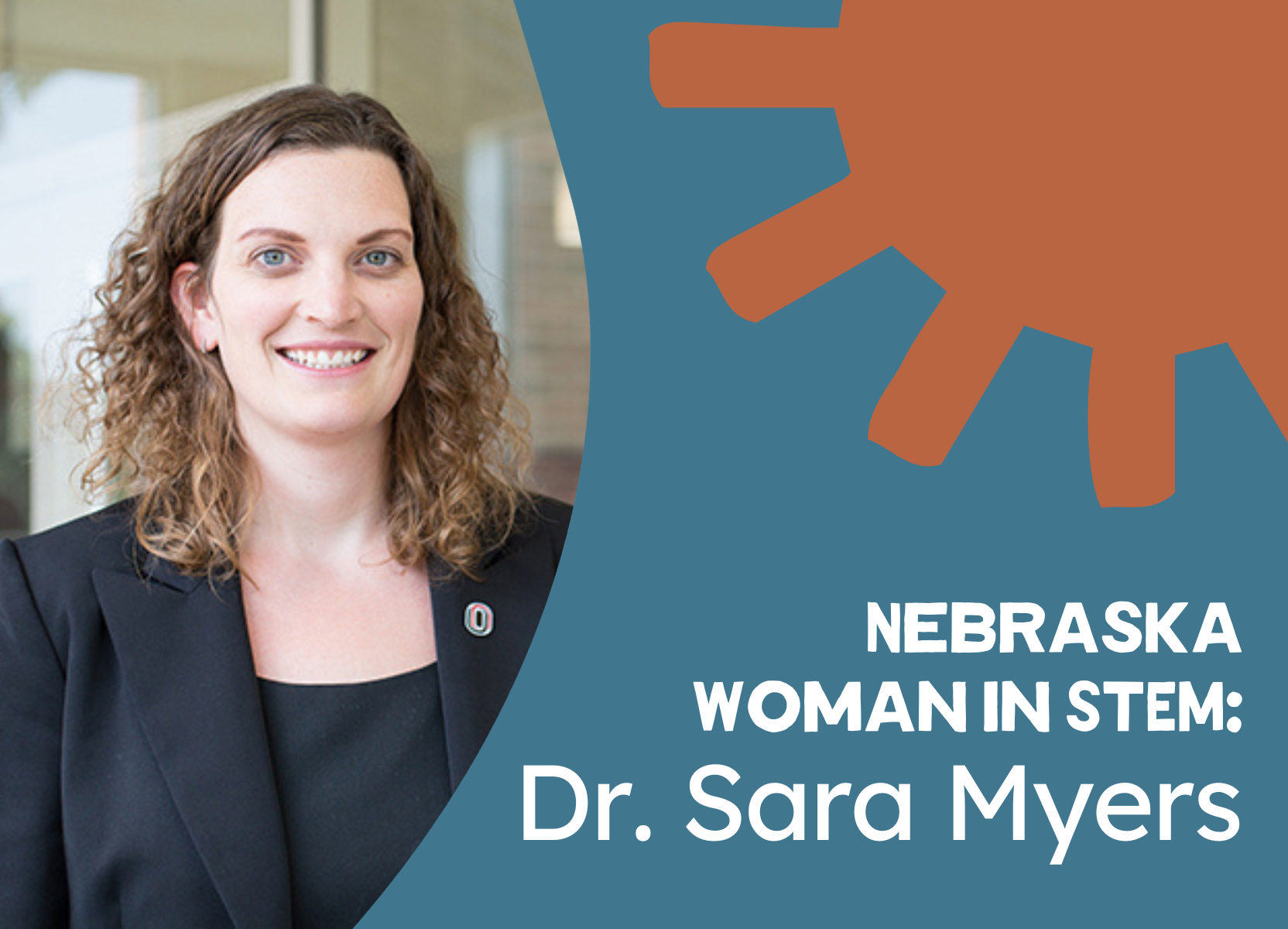Nebraska Women in STEM talked to Dr. Sara Myers about how growing up in an environment filled with science led to her career in STEM.

“The environment that I grew up in, science was everywhere,” explains Dr. Sara Myers, Associate Vice Chancellor for Research and Creative Activity at the University of Nebraska Omaha (UNO). “I was born with an inquisitive nature, and I was always very interested in why things work the way they do.”
Myers was born and raised in Hampton, Nebraska. She grew up on a farm and lived less than five miles away from all of her grandparents.
As a child, Myers would help her family tend to sick or injured animals on the farm and was curious about the science behind their treatments. These formative experiences grew into a desire to help people recover from sickness or injuries.
Myers also spent a lot of time with older individuals, including her nearby grandparents and involvement in the community. “Not only was I always with my grandparents, but my mom would take me and my siblings to different nursing homes in the area so we could sing, play piano, and perform for them,” says Myers. “It was always really rewarding to see how happy we made them. They just loved it, and it made me feel that working with an older generation is very rewarding.”
It was a combination of these experiences growing up that led Myers to be interested in a STEM career.
In 2001, Myers came to the University of Nebraska Omaha to study athletic training and sports medicine. After some time in that field and the birth of her first child, she realized it wasn’t for her.
“My husband and I had our first child between my sophomore and junior year of undergrad. I wouldn’t say it was a barrier, I’d say it was more of a motivator for me,” explains Myers. “People would always tell me, ‘Oh you’re not going to finish school’ and I would always respond with, ‘Watch me.'”
With her husband and child by her side, Myers continued school at UNO where she ultimately received a PhD. Today, she continues her journey at UNO in her role as the Associate Vice Chancellor for Research and Creative Activity and a professor in the biomechanics department, where her work with older generations and her desire to help people has evolved.
Myers spends a lot of her time doing research, mostly related to peripheral artery disease, which she has studied since grad school. This disease is most common among the elderly and working to help treat it is another way Myers can continue to help older generations. Her research has led to developing and testing assistive devices such as the robotic ankle exoskeleton. This device not only helps the elderly, but has military and industry applications as well. The military can utilize these assistive exoskeletons to enhance their performance through the spectrum of ankle injury rehabilitation.


One of Myers’ favorite parts of her job is watching her patients go from barely being able to move to exercising freely every day. “It’s life-changing to see,” said Myers.
Dr. Myers leads a research team that includes two research associates, two doctoral students and five undergraduates. Myers’ team uses every element of STEM to conduct their experiments. The team uses biomechanics, anatomy, physiology, computer science, engineering, and math to elevate their research. “We now have cameras that capture more than 1,000 frames per second, and we utilize that to achieve better precision,” she said.
Myers has a strong team around her but has also faced personal barriers.
“For me, the biggest barrier I have to face is that I’m pretty introverted, which leads to a lot of situations that are uncomfortable for me, especially when I’m in the lab,” Myers explained.
Myers would like to encourage more women to pursue faculty positions, in and outside her department. She tries to be a role model for these women to continue the mentoring she received in the past. “I always had a lot of women around me, going through school and as mentors, so I have always been extremely supported, especially here at UNO,” said Myers. “They help me overcome those barriers for sure. Through every situation, someone has been willing to help me by being honest and supportive.”
Myers mentions how blessed she was to have been surrounded by amazing mentors in her career, yet realizes that’s not the case for everyone. She wishes that people were more supportive of women in STEM and that these women could be given a better understanding of the various careers available to them.
“There are many impactful careers out there that people don’t even know exist, and I want us to be able to shine a light on them.”
Her message to incoming women in STEM is to not be afraid to try new things. “People can get so worried about not being sure what they want to do but it’s okay to not always know,” said Myers. “Try different things and find out what you like and don’t like, and then go from there.”
“It’s always worth taking a risk.”